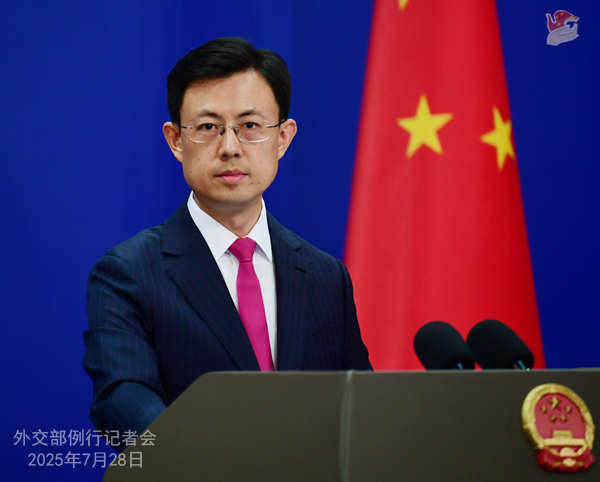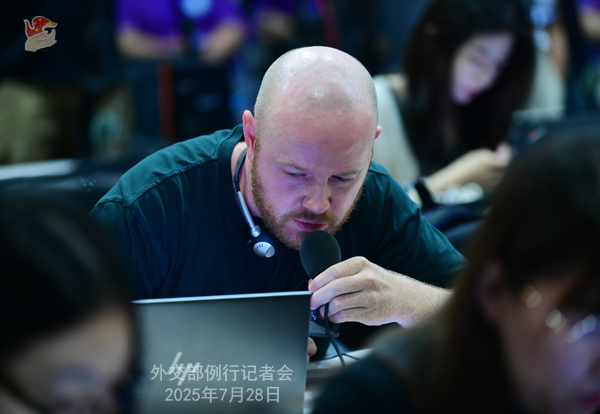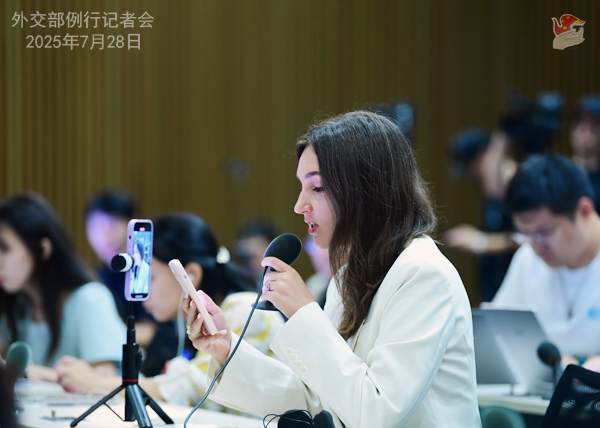
People’s Republic of China


Folha de S.Paulo: The U.S. government threatens to impose 50 percent tariffs against Brazil on August 1, a move seen as “setting example” to others in Latin America and BRICS. Do you have a comment on that? What can Brazil expect from China and BRICS in terms of opening markets to products like airplanes?
Guo Jiakun: China previously made clear its position on U.S. tariff hikes on Brazil. Let me stress that tariff wars have no winners, and unilateral practices serve no one’s interests. China stands ready to work with Brazil, and other Latin American and Caribbean countries and BRICS countries to jointly uphold the WTO-centered multilateral trading system and international fairness and justice.
On the cooperation on airplanes that you mentioned, let me reaffirm that China attaches importance to its result-oriented cooperation with Brazil, including cooperation on aviation. We stand ready to promote relevant cooperation based on market principles and give a boost to respective national development.
RT TV: Zelenskyy said on Sunday that he had approved the new sanctions of the Ukrainian National Security and Defense Council. He said in a statement that restrictions from the 18th sanctions package have now been applied to 53 individuals and entities from China and other countries. What’s China’s comment?
Guo Jiakun: China, as always, opposes unilateral sanctions that have no basis in international law or authorization of the UN Security Council. We urge the Ukrainian side to correct its mistake at once and undo the negative effect. China will firmly safeguard the legitimate and lawful rights and interests of Chinese companies.
CCTV: It’s reported that the head of Taiwan’s so-called foreign affairs department recently made a “private” trip to Japan and met with Japanese politicians, including former economic security minister Sanae Takaichi and director of the LDP Youth Division Nakasone Yasutaka. What’s China’s comment?
Guo Jiakun: By allowing Lin Chia-lung to make the so-called “private” trip, Japan provided a platform for “Taiwan independence” forces to engage in anti-China separatist activities, seriously violated the basic norms governing international relations and the principles in the four political documents between China and Japan, and sent out a gravely wrong signal. China strongly deplores and firmly opposes it. We’ve lodged serious representations to the Japanese side in Beijing and Tokyo and made strong protests.
Taiwan is an inalienable part of China’s territory. The Taiwan question is at the core of China’s core interests, and bears on the political foundation of China-Japan relations and basic trust between the two countries. This year marks the 80th anniversary of the victory of the Chinese People’s War of Resistance Against Japanese Aggression, the World Anti-Fascist War, and the restoration of Taiwan. Japan’s colonial rule over Taiwan lasted for more than 50 years and Japan bears serious historical responsibilities to the Chinese people.
We urge Japan to abide by the principles in the four political documents between China and Japan, act on its solemn commitment, deeply reflect on and learn lessons from history, act all the more prudently on the Taiwan question, not to harm China’s sovereignty in any way and not to send any wrong signals to “Taiwan independence” separatist forces. Japan should never underestimate the firm resolve, will and ability of the Chinese people to safeguard sovereignty and territorial integrity.
China Review News: It’s reported that Hong Kong police issued arrest warrants for 19 people involved in organizing, establishing or participating in overseas a subversive organization named the “Hong Kong Parliament.” We noted that some countries pointed their fingers at this issue. What’s your comment?
Guo Jiakun: China deplores and opposes relevant countries’ irresponsible criticism against the law enforcement operation of the government of the Hong Kong Special Administrative Region. We firmly support the Hong Kong SAR government in fulfilling their duties in accordance with the law and the Hong Kong police in lawfully carrying out the law enforcement operation.
The people on the wanted list that you mentioned organized an illegal election to establish a so-called “Hong Kong Parliament” to subvert state power. Their egregious move severely violates the National Security Law, challenges the principles of “One Country, Two Systems,” which is a red line that must not be crossed, and endangers national sovereignty, security and development interests. The Hong Kong police’s lawful issuance of arrest warrants for them is fully just to uphold the rule of law in Hong Kong, necessary to defend national sovereignty and security, and legitimate to safeguard the lasting peace of Hong Kong. It’s in line with international law and common practices.
Hong Kong affairs are purely China’s internal affairs. Relevant countries should respect China’s sovereignty and Hong Kong’s rule of law, and stop emboldening anti-China, destabilizing elements.

Reuters: The Thai acting prime minister said on Monday that China had reached out to help resolve the conflict between Thailand and Cambodia. Is this accurate? Could you give us more details about what help China offered?
Guo Jiakun: Cambodia and Thailand are and will always be each other’s neighbors. Both countries are China’s friends and neighbors as well. Maintaining good-neighborliness and mutual trust and properly managing differences serves the two countries’ fundamental and long-term interests, and the region’s peace and stability. China is deeply saddened by the casualties inflicted on both sides and expresses heartfelt sympathies. We hope both sides will bear in mind the interests of the two peoples, cherish peace and good-neighborliness, exercise calm and restraint, come to a ceasefire as soon as possible, settle differences peacefully through dialogue and consultation, and restore peace and stability along the border soon.
Both Cambodia and Thailand are important members of ASEAN. ASEAN has been working intensively for days to bring about a ceasefire between the two sides. China commends it and welcomes all efforts conducive to deescalation. China will maintain its fair and impartial position and continue having close communication with both sides, actively facilitate talks for peace and play a constructive role for a ceasefire.
Global Times: We’ve learned that recently, another Chinese scholar who has conducted research in the U.S. was groundlessly detained by U.S. law enforcement agencies. What’s the Ministry’s comment?
Guo Jiakun: For quite some time, the U.S. has overstretched the concept of national security to frequently harass and interrogate Chinese students and scholars in the U.S., and even arrest and prosecute them by trumpeting up charges. This severely infringes on the lawful rights and interests of Chinese students and scholars, disturbs China-U.S. people-to-people and cultural exchanges, in particular education cooperation, and will end up tarnishing the U.S.’s own image and reputation in the world.
We urge the U.S. to stop presumption of guilt and political manipulation, stop its politically driven and discriminatory law enforcement targeting Chinese students and scholars in the U.S., and act on the U.S. leader’s statement of welcoming Chinese students to study in the U.S. China will firmly safeguard the legitimate and lawful rights and interests of Chinese students and scholars overseas, and remind students in the U.S. to be mindful of potential risks.
Reuters: The U.S. and China are about to start trade talks in Sweden. What is China’s position going into the talks?
Guo Jiakun: For the specifics of the economic and trade talks between China and the U.S. in Sweden, you may stay tuned. Let me stress that China’s position on the economic and trade issue is consistent and clear. We hope that the U.S. will work with China to act on the important common understandings reached by the two presidents during the phone call, make good use of the consultation mechanism, have more consensus and cooperation and less misperception through communication and dialogue on the basis of equality, respect and mutual benefit, and promote the steady, sound and sustainable development of China-U.S. relations.

Bloomberg: Just now you said that the charges that the Hong Kong government has made or the charges that they put against 19 people overseas are in accordance with international law. Can you tell me specifically which international laws allow the Hong Kong government to charge Australian nationals for actions and comments in Australia? The Australian foreign minister specifically protested the actions of Hong Kong as interference in Australia’s judicial sovereignty. Can you please point to the international laws that Hong Kong is basing these actions on?
Guo Jiakun: Hong Kong follows the rule of law. All laws in Hong Kong must be observed and those who break the law must be held accountable. This is the basic principle. No one shall engage in unlawful activities and attempt to escape justice. Pursuant to the Hong Kong National Security Law and the Safeguarding National Security Ordinance, the Hong Kong police carries out the law enforcement operation targeting anti-China, destabilizing elements overseas, which is in line with international law and common practices. We firmly support the Hong Kong SAR in vigorously implementing the Hong Kong National Security Law and the Safeguarding National Security Ordinance, and the Hong Kong police in cracking down on anti-China, destabilizing elements who escaped overseas.
AFP: Yesterday, the Taiwan authorities’ recall vote against lawmakers from Kuomintang failed. What’s China’s comment?
Guo Jiakun: The spokesperson of the Taiwan Affairs Office of the State Council made statements on this. The results of the vote demonstrate that the DPP authorities’ political manipulation goes against the will of the people on the island and finds no support. Let me stress that there is but one China in the world, and Taiwan is an inalienable part of China’s territory. The Taiwan question is China’s internal affairs, which brooks no external interference.
Reuters: Regarding the trade talks, the EU said that their recent deal with the U.S. was “not ideal” but “the best” deal that they could get. Would China be willing to accept a suboptimal deal if that is all that is on the table or is China willing to walk away from the talks if necessary?
Guo Jiakun: On the trade deal between the U.S. and the EU that you mentioned, let me say that China, as always, believes that all parties should resolve economic and trade differences through equal-footed dialogue, uphold a sound environment for international trade and economic cooperation, and observe the WTO rules. That said, we firmly oppose any party’s move to strike a deal at the cost of China’s interests.
AFP: CK Hutchison Holdings Limited said today that it plans to bring on a major strategic Chinese investor for a consortium backed by the U.S. to jointly discuss the deal on ports in the Panama Canal. What’s China’s comment?
Guo Jiakun: We noted the relevant statement. The Chinese government will conduct lawful regulation, firmly safeguard national sovereignty, security and development interests, and uphold justice and fairness in the market.
Bloomberg: The Financial Times reported earlier today that the U.S. has frozen all new export controls against Chinese entities as a gesture ahead of the trade talks and that China has agreed to do the same. Can you comment on the report from the Financial Times that the U.S. is freezing any new export controls on Chinese entities?
Guo Jiakun: The trade and economic cooperation between the two countries is mutually beneficial in nature. We, as always, hope that the U.S. will work with China to act on the important common understandings reached by the two presidents during the phone call, have more consensus and cooperation and less misperception through communication and dialogue on the basis of equality, respect and mutual benefit, and promote the steady, sound and sustainable development of China-U.S. relations.



